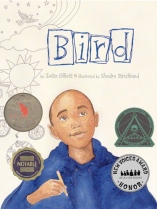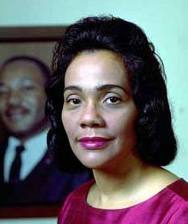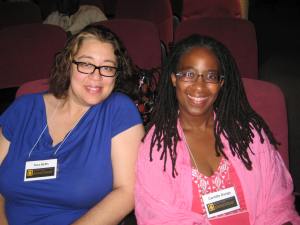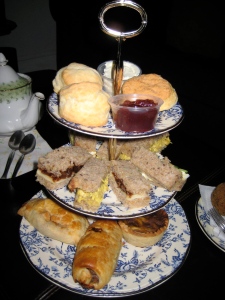 My grandmother was an ardent admirer of Dr. Martin Luther King, Jr. A “colored” woman raised in Canada to pass for white, my grandmother proudly displayed a framed copy of Dr. King’s “I Have a Dream” speech on the wall of her home. As a teenager in Toronto I took a class on American history in order to learn more about the “Negro” ancestors my grandmother so often discussed, and I was devastated when she made a gift of the speech to my frivolous older sister. I was the one teaching the Civil Rights Movement to my high school classmates; I was the one who could recite portions of the speech by heart. My grandmother did give me her carefully preserved copy of Life magazine and though I admired Mrs. King’s sorrowful yet elegant profile, I still harbored resentment over the allocation of the speech. That piece of parchment went from a place of honor in my grandparents’ manse to the wall of my sister’s apartment; it hung next to the stereo, which blared lyrics by Jay-Z that would have made Mrs. King blanch. It took years for me to realize that my grandmother gave Dr. King’s speech to the granddaughter who needed it most. I wrongly thought that my investment in social justice entitled me to inherit the framed speech, but my grandmother knew that I was ready for something more and she was right—by my last year of college I was critiquing the “I Have a Dream” speech in the campus newspaper.
My grandmother was an ardent admirer of Dr. Martin Luther King, Jr. A “colored” woman raised in Canada to pass for white, my grandmother proudly displayed a framed copy of Dr. King’s “I Have a Dream” speech on the wall of her home. As a teenager in Toronto I took a class on American history in order to learn more about the “Negro” ancestors my grandmother so often discussed, and I was devastated when she made a gift of the speech to my frivolous older sister. I was the one teaching the Civil Rights Movement to my high school classmates; I was the one who could recite portions of the speech by heart. My grandmother did give me her carefully preserved copy of Life magazine and though I admired Mrs. King’s sorrowful yet elegant profile, I still harbored resentment over the allocation of the speech. That piece of parchment went from a place of honor in my grandparents’ manse to the wall of my sister’s apartment; it hung next to the stereo, which blared lyrics by Jay-Z that would have made Mrs. King blanch. It took years for me to realize that my grandmother gave Dr. King’s speech to the granddaughter who needed it most. I wrongly thought that my investment in social justice entitled me to inherit the framed speech, but my grandmother knew that I was ready for something more and she was right—by my last year of college I was critiquing the “I Have a Dream” speech in the campus newspaper.
 Since penning that editorial twenty years ago I have worked to develop my skills as a black feminist cultural critic. In 1994 I reversed the migration that brought my African American ancestors to Canada in 1820. Unfortunately my grandmother passed in 2002, months before I earned my PhD in American Studies from NYU; my dissertation, which focused on representations of racial violence in African American literature, was dedicated to her. I currently teach courses on race, gender, and sexuality in the Center for Ethnic Studies at BMCC, a community college in lower Manhattan that serves mostly immigrant and working-class students of color. Many are reluctant readers and so I’ve had to develop innovative ways of introducing them to black literature, which they wrongly expect to be irrelevant, outdated, and uninteresting. In addition to my teaching I’ve published scholarly essays, short fiction, and poetry in various anthologies, and my plays have been staged in New York, Chicago, and Cleveland. I’ve also published three books for young readers—one of which, BIRD, won numerous awards after its publication in 2008, including a Coretta Scott King/John Steptoe Award for New Talent for the illustrator, Shadra Strickland. Though she hoped at least one of her grandchildren would follow in her footsteps and become a preacher, overall I think my grandmother would approve.
Since penning that editorial twenty years ago I have worked to develop my skills as a black feminist cultural critic. In 1994 I reversed the migration that brought my African American ancestors to Canada in 1820. Unfortunately my grandmother passed in 2002, months before I earned my PhD in American Studies from NYU; my dissertation, which focused on representations of racial violence in African American literature, was dedicated to her. I currently teach courses on race, gender, and sexuality in the Center for Ethnic Studies at BMCC, a community college in lower Manhattan that serves mostly immigrant and working-class students of color. Many are reluctant readers and so I’ve had to develop innovative ways of introducing them to black literature, which they wrongly expect to be irrelevant, outdated, and uninteresting. In addition to my teaching I’ve published scholarly essays, short fiction, and poetry in various anthologies, and my plays have been staged in New York, Chicago, and Cleveland. I’ve also published three books for young readers—one of which, BIRD, won numerous awards after its publication in 2008, including a Coretta Scott King/John Steptoe Award for New Talent for the illustrator, Shadra Strickland. Though she hoped at least one of her grandchildren would follow in her footsteps and become a preacher, overall I think my grandmother would approve.
 I speak to hundreds of school children every year and my author presentation always begins with the shiny stickers on the cover of BIRD. Here in the US, children always know who Coretta Scott King was and they know that, like her husband, she believed in justice and equality for all. We talk about the way awards draw attention to a particular book and often ensure that it won’t go out of print. Then I ask the children to guess how many books are published in the US each year. Once we settle on the figure (about 5,000), I ask the children to guess what percentage of those books have black authors. They’re natural optimists, children. Most of the students I meet attend majority-black schools—urban schools that are just as segregated as those that predate the Civil Rights Movement—and it’s not uncommon for them to have black-authored books in the classroom. So there are always gasps of amazement when I hold up three fingers and inform them that less than 3% of all the children’s books published each year are written by authors who look like them. I add that Asian American, Latino, and Native American authors each represent less than 1% of the total, leaving 95% of all books for children written by members of one racial group. “Does that sound fair to you?” I ask and invariably I hear a chorus of indignant NOs in response.
I speak to hundreds of school children every year and my author presentation always begins with the shiny stickers on the cover of BIRD. Here in the US, children always know who Coretta Scott King was and they know that, like her husband, she believed in justice and equality for all. We talk about the way awards draw attention to a particular book and often ensure that it won’t go out of print. Then I ask the children to guess how many books are published in the US each year. Once we settle on the figure (about 5,000), I ask the children to guess what percentage of those books have black authors. They’re natural optimists, children. Most of the students I meet attend majority-black schools—urban schools that are just as segregated as those that predate the Civil Rights Movement—and it’s not uncommon for them to have black-authored books in the classroom. So there are always gasps of amazement when I hold up three fingers and inform them that less than 3% of all the children’s books published each year are written by authors who look like them. I add that Asian American, Latino, and Native American authors each represent less than 1% of the total, leaving 95% of all books for children written by members of one racial group. “Does that sound fair to you?” I ask and invariably I hear a chorus of indignant NOs in response.
 When I saw the list of CSK Award recipients on Monday, I wondered what Coretta Scott King would think. I never had the privilege of meeting Mrs. King and all I know about the award is what I’ve read on the ALA website. I know that in 2009 the CSK Book Award celebrated its fortieth anniversary, and I do believe that black authors and illustrators are better off today than they were in the “all-white world of children’s books” of the 1970s. But when we look at the small number of authors and illustrators who seem to win a CSK Award year after year after year, are we looking at a picture of real diversity? Is the award helping to increase the overall pool of black authors and illustrators, or is it merely upholding the status quo by feeding a few big fish in a very small pond? Publishers no doubt realize the committee’s seeming preference for books about Dr. King and Rosa Parks and (a few) other historical figures. Does an editor’s desire to win yet another shiny sticker deter her from publishing other authors of other kinds of books that also “demonstrate an appreciation of African American culture and universal human values?”
When I saw the list of CSK Award recipients on Monday, I wondered what Coretta Scott King would think. I never had the privilege of meeting Mrs. King and all I know about the award is what I’ve read on the ALA website. I know that in 2009 the CSK Book Award celebrated its fortieth anniversary, and I do believe that black authors and illustrators are better off today than they were in the “all-white world of children’s books” of the 1970s. But when we look at the small number of authors and illustrators who seem to win a CSK Award year after year after year, are we looking at a picture of real diversity? Is the award helping to increase the overall pool of black authors and illustrators, or is it merely upholding the status quo by feeding a few big fish in a very small pond? Publishers no doubt realize the committee’s seeming preference for books about Dr. King and Rosa Parks and (a few) other historical figures. Does an editor’s desire to win yet another shiny sticker deter her from publishing other authors of other kinds of books that also “demonstrate an appreciation of African American culture and universal human values?”
The soft-minded man always fears change. He feels security in the status quo, and he has an almost morbid fear of the new. For him, the greatest pain is the pain of a new idea.
Self-published author and quilter Kyra Hicks has conducted an analysis of the award recipients and her findings indicate that the past four decades have produced a sort of winners club, an African American artistic elite whose insider status affords them creative opportunities too often denied their emerging and/or aspiring peers. It would seem as if the John Steptoe Award for New Talent, “occasionally given for young authors or illustrators who demonstrate outstanding promise at the beginning of their careers,” was developed to help remedy this situation and yet it was not given out in 2011 or 2012, which puzzles me. The African American authors and illustrators at The Brown Bookshelf annually publish a list of 28 contributors to the field of black children’s literature. Is it possible that the CSK Book Awards Committee found no one worthy of recognition for two consecutive years?
Perhaps it is easier to look backward at the past, which is familiar and safe, than it is to look forward where new possibilities—frightening to some—extend across the shifting terrain of the future. Yet the recent presidential election revealed the danger (and ultimate futility) of holding onto a romanticized version of the past, and the 2008 election of Barack Obama demonstrated that eventually the old guard must yield to the new. The publishing world is gripped by upheaval right now and many steadfastly cling to old models for fear of embracing innovation and developing new traditions that will respond to and reflect the realities of the twenty-first century. With so-called minorities expected to make up the majority of the US population in thirty years (minority babies already constitute the majority), what can the CSK Book Awards Committee do to ensure that equity—an ideal cherished by Dr. and Mrs. King—is not undermined by the children’s publishing industry? If 95% of children’s book authors were men, white women across the country would mobilize to create change. But where is the outrage over racial dominance in the children’s literature community?
In the end, we will remember not the words of our enemies, but the silence of our friends.
In the past I have defended the CSK Award against claims that writers of all races should be eligible. With less than 3% of the publishing pie, though we constitute 13% of the US population, I felt that black authors and illustrators deserved something to call their own. Today I am less convinced of the relevance of the CSK Awards and wonder if I ought to revise the portion of my author presentation that claims the award reflects the values of Dr. and Mrs. King. The award-granting process is often controversial and generally shrouded in secrecy, though a 2010 article in School Library Journal lifted the veil on the Caldecott Medal. The CSK Book Awards Committee considers all genres, I believe, but the Caldecott focuses on one genre illustrated books only and still jury members can expect to review more than 700 titles each year. I am not entirely convinced of the link between quantity and quality in books, but there is something to be said for competition and I think creativity truly flourishes when more (and more kinds of) people are invited to the drawing table. As television’s numerous talent competitions demonstrate, the US has a deep pool of gifted individuals who are simply waiting for an opportunity to shine.
Last year I received a grant from the Canada Council for the Arts to write a family memoir about my African American ancestors; I am anxious to explore the social pressures that first led them to flee slavery in the US only to further escape into whiteness in order to avoid racism in Canada. In my country of origin, an average of two black authors manage to publish a book for children each year, making a race-based award like the CSK impossible. Things are better here in the US, which is why I chose to relocate, but after more than a decade trying to publish my twenty manuscripts for young readers, I’m ready to throw in the towel and move on. I am close to completing two young adult novels, both speculative fiction, and once they’re done I plan to leave the world of children’s literature behind. I am disappointed by the complacency of so many individuals and institutions that claim to have children’s best interest at heart, yet I am encouraged by the fact that a small group of activists is currently in the process of reviving/reinventing the Council on Interracial Books for Children. I will do what I can to assist with the launch of this endeavor, and I hope its emphasis on social justice will truly honor the transformative vision of Dr. and Mrs. King.
Read Full Post »
















 brewing in my mind. Ever since I found out about
brewing in my mind. Ever since I found out about  and couldn’t help but frown at the way wealth enabled Beatrix Potter to develop her charming characters and highly profitable book series. She was encouraged to sketch and paint as the child of wealthy parents, she was taken on annual holidays that nourished her imagination, and then she had the choice of accepting an aristocratic suitor or remaining unmarried in her parents’ home. She had the time and means to produce art—something a working class woman wouldn’t have had. I love Peter Rabbit and I know it wasn’t easy for even a wealthy white woman to become a published author at the turn of the 20th century. But most women in the world can’t afford the luxury of a room of one’s own—never mind a home full of servants who silently cook your food and wash your clothes. Mary and I discussed my future as an author and she encouraged me to stay in the academy. I became debt-free this year and plan to work hard at staying debt-free for as long as possible. But as someone who doesn’t write commercial fiction and struggles to place each manuscript, the academy is a decent home. What other job would give me five weeks to write over the holidays? This past semester nearly broke me but I’m developing a new course for the spring and hope that finishing The Deep will lift my spirits. I’m working on my end of year slideshow and was surprised to see how productive 2012 was—I fell short of some goals but achieved others and have a long To Do list ready for 2013.
and couldn’t help but frown at the way wealth enabled Beatrix Potter to develop her charming characters and highly profitable book series. She was encouraged to sketch and paint as the child of wealthy parents, she was taken on annual holidays that nourished her imagination, and then she had the choice of accepting an aristocratic suitor or remaining unmarried in her parents’ home. She had the time and means to produce art—something a working class woman wouldn’t have had. I love Peter Rabbit and I know it wasn’t easy for even a wealthy white woman to become a published author at the turn of the 20th century. But most women in the world can’t afford the luxury of a room of one’s own—never mind a home full of servants who silently cook your food and wash your clothes. Mary and I discussed my future as an author and she encouraged me to stay in the academy. I became debt-free this year and plan to work hard at staying debt-free for as long as possible. But as someone who doesn’t write commercial fiction and struggles to place each manuscript, the academy is a decent home. What other job would give me five weeks to write over the holidays? This past semester nearly broke me but I’m developing a new course for the spring and hope that finishing The Deep will lift my spirits. I’m working on my end of year slideshow and was surprised to see how productive 2012 was—I fell short of some goals but achieved others and have a long To Do list ready for 2013. 








